I am considering using a strategy pattern for configuration file management, that way I can support some legacy configs. I feel pretty solid on the overall design (as its pretty standard strategy pattern), but I am curious if the client should know the type of strategy that is being implemented or if that violates the strategy pattern. Specifically the ConfigurationParser constructor requires an istream and a string (or maybe enum) of the type of stream it is (xml, json, ini, etc.) to know which concrete strategy to instantiate.
Ideally I would like to just pass the istream, but if I do that then I probably have to put in code in the ConfigurationParser to discern the stream type by looking for angle brackets vs square brackets or something of the sort.
I decided to not pass a string file path and determine type from extension because the legacy stuff isnt always consistent in extension naming and it makes my code a lot easier to test if I pass streams instead of hard coding file paths.

